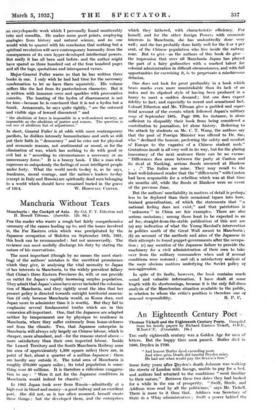Manchuria Without Tears
Manchuria : the Cockpit of Asia. By Col. P. T. Etherton and IT. Ilessell Tiltman, (Jarrolds. 12s. ad.)
FOR the reader who wants a rough but fairly comprehensive summary of the causes leading up to, and the issues involved in, the Far Eastern crisis which was precipitated by the Japanese occupation of Mukden on September 18th, 1981, this book can be recommended : but not unreservedly. The reviewer can most usefully discharge his duty by stating the nature of his reservations.
The most important (though by no means the most start- ling) of the authors' mistakes is the uncritical prominence which they give, in analysing the vital necessity to Japan of her interests in Manchuria, to the widely prevalent fallacy that China's three Eastern Provinces do, will, or can provide an outlet for Japan's rapidly increasing surplus population. They admit that Japan's aims have never included the coloniza, lion of Manchuria,. and they rightly scout the idea that her present policy is directed towards outright territorial annexa- tion (if only because Manchuria would, as Korea does, cost Japan more to administer than it is worth). But they fail to emphasize several fundamental truths which are in this connexion all-important. One, that the Japanese are adapted neither by temperament nor by physique to residence hi Manchuria, where they suffer extremely from home-sickness and from the climate. Two, that Japanese enterprise in Manchuria will always rely largely on Chinese labour, which is cheaper, more abundant, and—for the reasons stated above— more satisfactory than their own imported labour. Inside the Leased Territory and the South Manchuria Railway zone (an area of approximately 1,300 square miles) there are, in point of fact, about a quarter of a million Japanese : there are hardly any outside it. The total area of Manchuria is roughly 870,000 square miles ; . its total population is some- thing over 30 millions. it is therefore a ridiculous exaggera- tion to say : "Were it not for the Japanese conditions in Manchuria would indeed be chaotic."
In 1905 Japan -took over from Russia—admittedly at a high cost in blood and money—a good railway and an excellent port. She did not, as is too often .assumed, herself create these things; but she developed thein, and the enterprises which they fathered, with characteristic efficiency. For herself, and for the other foreign Powers with economic interests in Manchuria, she has undoubtedly done very well ; and she has probably done fairly well for the 8 or 4 per cent, of the Chinese population who live inside the railway zone. But to give—as the authors of this book do give-- the impression that over all Manchuria Japan has played the part of a fairy godmother with a marked talent for colonial administration in difficult circumstances, and with full opportunities for exercising it, is to perpetuate a mischievous delusion.
One does not look for great profundity in a book which bears marks- even more unmistakable than its lack of an index and its slipshod style of having been produced in hurry to meet a sudden deniand ; but one does expect fidelity to fact, and especially to recent and sensational fact. Colonel Etherton and Mr. Tillman give a garbled and super- ficial account of the events which followed Japan's military coup of September 18th. Page 200, for instance, is alone sufficient to disqualify their book front being considered a contribution to journalism, let alone history. Referring to the attack by students on Mr. C. T. Wang, the authors say that the post of Foreign Minister was offered to Dr. Su.; who "declined the honour, preferring the safety and comfort of Europe to the vagaries of a Chinese student mob." Gratuitous insult is all very well in its way, but tor the glaring inaccuracy of the next sentence there can be no excuse. "Differences then arose" between the party at Canton and its rival at Nanking, serious floods occurred at Hankow . . ." The italics are mine. They may recall to the least well-informed reader that the "differences" with Canton had been responsible for a rebellion which was at that time six months old, while the floods at Hankow were an event of the previous June.
But the authors' unreliability in matters of detail is perhaN!, less to be deplored than their occasional lapses into bare. brained generalization, of which the statements that "a national feeling does not exist," and that patriotism is "
unknown" in China are fair examples. There are also serious omissions ; among those least to be expected in an ad hoc, straight-from-the-stable publication of this sort are
(a) any indication of what the Young Marshal's intervention in polities south of the Great Wall meant to Manchuria ;
(b) an account of the Methods and aims of the Japanese in theft' attempts to found puppet-governments after the occupa- tion; (c) any mention of the Japanese failure to provide the machinery for a civil administration of their own to take - over from the military contmanders when and if normal conditions were restored ; and (d) a satisfactory analysis of the more obvious motives underlying the Soviet policy of non-aggression.
In spite of its faults, however, the book contains much sound and valuable information. I have dealt, at some length with its shortcomings, because it is the only full-dress analysis of the Manchurian situation available to the public, in -relation to whom the critic's position is therefore one of


















































 Previous page
Previous page